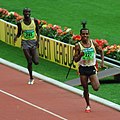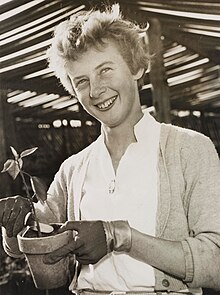Introduction

Athletics is a group of sporting events that involves competitive running, jumping, throwing, and walking. The most common types of athletics competitions are track and field, road running, cross-country running, and racewalking.
The results of racing events are decided by finishing position (or time, where measured), while the jumps and throws are won by the athlete that achieves the highest or furthest measurement from a series of attempts. The simplicity of the competitions, and the lack of a need for expensive equipment, makes athletics one of the most common types of sports in the world. Athletics is mostly an individual sport, with the exception of relay races and competitions which combine athletes' performances for a team score, such as cross country.
Organized athletics are traced back to the Ancient Olympic Games from 776 BC. The rules and format of the modern events in athletics were defined in Western Europe and North America in the 19th and early 20th century, and were then spread to other parts of the world. Most modern top level meetings are held under the auspices of World Athletics, the global governing body for the sport of athletics, or its member continental and national federations. (Full article...)
General images -
Selected article

Sprinting is running over a short distance at the top-most speed of the body in a limited period of time. It is used in many sports that incorporate running, typically as a way of quickly reaching a target or goal, or avoiding or catching an opponent. Human physiology dictates that a runner's near-top speed cannot be maintained for more than 30–35 seconds due to the depletion of phosphocreatine stores in muscles, and perhaps secondarily to excessive metabolic acidosis as a result of anaerobic glycolysis.
In athletics and track and field, sprints (or dashes) are races over short distances. They are among the oldest running competitions, being recorded at the Ancient Olympic Games. Three sprints are currently held at the modern Summer Olympics and outdoor World Championships: the 100 metres, 200 metres, and 400 metres. (Full article...)
| More selected articles |
Selected picture

Athlete birthdays
11 July:
- Earlene Brown, American shot putter and discus thrower
- Monique Éwanjé-Épée, French hurdler
- Kostas Kenteris, Greek sprinter
- Lynn Williams, Canadian middle- and long-distance runner
12 July:
- Yarelis Barrios, Cuban discus thrower
- Otis Davis, American sprinter
- Andrey Mikhnevich, Belarusian shot putter
- Bruny Surin, Canadian sprinter
- Juha Väätäinen, Finnish distance runner
- Andrae Williams, Bahamian sprinter
13 July:
- Hjalmar Andersson, Swedish distance runner
- Rod Dixon, New Zealand middle- and long-distance runner
- Helena Fibingerová, Czechoslovakian shot putter
- Lien Gisolf, Dutch high jumper
- Liu Xiang, Chinese hurdler
- Jonni Myyrä, Finnish javelin thrower
- Ineta Radēviča, Latvian long jumper
- Raúl Spank, German high jumper
- Andrei Tivontchik, German pole vaulter
- Viktor Tsybulenko, Soviet javelin thrower
14 July:
- Amy Acuff, American high jumper
- Judi Brown, American hurdler
- Yvonne Buschbaum, German pole vaulter
- Marlene Mathews, Australian sprinter
- Oleksandr Pyatnytsya, Ukrainian javelin thrower
- Willie Steele, American long jumper
- Mike Stulce, American shot putter
- Heinz Weis, German hammer thrower
15 July:
- Enrique Figuerola, Cuban sprinter
- Hector Hogan, Australian sprinter
- Serhiy Lebid, Ukrainian distance runner
- Éloyse Lesueur, French long jumper
- Natalya Sadova, Russian discus thrower
- Toshihiko Seko, Japanese distance runner
- Erik Wilén, Finnish sprinter and hurdler
16 July:
- Lee Barnes, American pole vaulter
- Tatyana Biryulina, Soviet javelin thrower
- Svetlana Feofanova, Russian pole vaulter
- Uwe Hohn, German javelin thrower
- Steve Hooker, Australian pole vaulter
- Natalya Lisovskaya, Soviet shot putter
- Kellie Wells, American hurdler
- Gerd Wessig, German high jumper
17 July:
- Davis Kamoga, Ugandan sprinter
- Moses Mosop, Kenyan distance runner
- Rashid Ramzi, Moroccan-Bahraini middle-distance runner
Related portals
More did you know
- ... that Ethiopian long-distance runner Atsede Habtamu set a new course record at the Eindhoven Marathon with her first marathon victory earlier this month?
- ... that 2006 National Capital Marathon winner Amos Tirop Matui was disqualified and received financial compensation due to a misplaced barrier on the course?
- ... that Australian runner Michael Shelley lost his scholarship funding and suffered a broken leg in 2009, but went on to win a silver medal in the marathon at the 2010 Commonwealth Games?
- ... that Irene Kosgei, despite injuring her knee at a drinks station early in the women's marathon at the 2010 Commonwealth Games, edged compatriot Irene Mogaka to become the first Kenyan woman to win a Commonwealth marathon title?
| Archive |
Selected biography
Elizabeth Alyse Cuthbert AC, MBE (20 April 1938 – 6 August 2017), was an Australian athlete and a four-time Olympic champion. She was nicknamed Australia's "Golden Girl". During her career, she set world records for 60 metres, 100 yards, 200 metres, 220 yards and 440 yards. Cuthbert also contributed to Australian relay teams completing a win in the 4 × 100 metres, 4 × 110 yards, 4 × 200 metres and 4 × 220 yards. Cuthbert had a distinctive running style, with a high knee lift and mouth wide open. She was named in 1998 an Australian National Treasure and was inducted as a Legend in the Sport Australia Hall of Fame in 1994 and the Athletics Australia Hall of Fame in 2000. (Full article...)
| More selected biographies |
Did you know (auto-generated) -

- ... that Marthe Yankurije, who dropped out of school during her fourth year of secondary school, competed at the 2020 Summer Olympics?
- ... that at the 2022 British Indoor Athletics Championships, Lorraine Ugen equalled the championship long jump record?
- ... that in the 1932 baseball game in which pitcher Eddie Rommel won his last game, he pitched 17 innings in relief, an American League record?
- ... that when the Oakland Athletics promoted Bill McNulty to the major leagues, they needed forest rangers to find him?
- ... that the women's race at today's New York City Marathon will feature two of the medalists from this year's Olympic marathon?
- ... that the men's 100 metres event at the 2023 British Athletics Championships was run in heavy rain?
- ... that German runner Alica Schmidt, who is running in the Women's 4 × 400 metres relay at the 2020 Summer Olympics, has won multiple European junior relay medals?
- ... that at the 2022 British Athletics Championships, Daryll Neita became the first woman since 2010 to win both the 100- and 200-metre events?
World records
Topics
Athletics events
|
|
|
|
|
Athletics competitions
It's from the first edition (1896 Summer Olympics), that Athletics has been considered the "Queen" of the Olympics. Since then there have been a series of competitions organized at world level, than at the continental level. Furthermore, the Athletics is the main sport of nearly all multi-sport events such as Universiade, Mediterranean Games or Pan American Games. The following list refers to the main Athletics competitions that take place in the world.
| Event | 1st edition | Kind of competition | Can participate |
|---|---|---|---|
| Olympic Games | 1896 | World games | |
| World Championships | 1983 | World championships | |
| World Indoor Championships | 1985 | ||
| European Championships | 1934 | Continental championships | |
| European Indoor Championships | 1966 | ||
| South American Championships | 1919 | ||
| Asian Championships | 1973 | ||
| African Championships | 1979 | ||
| Ocenian Championships | 1990 |
Federations
- Internationals
 International Association of Athletics Federations (IAAF)
International Association of Athletics Federations (IAAF) European Athletics Association (EAA)
European Athletics Association (EAA) Confederation of African Athletics (CAA)
Confederation of African Athletics (CAA) Asian Athletics Association (AAA)
Asian Athletics Association (AAA) North American, Central American and Caribbean Athletic Association
North American, Central American and Caribbean Athletic Association CONSUDATLE
CONSUDATLE Oceania Athletics Association (OAA)
Oceania Athletics Association (OAA)
- Nationals
 Australia: Athletics Australia (AA)
Australia: Athletics Australia (AA) Brazil: Brazilian Athletics Confederation (CBAt)
Brazil: Brazilian Athletics Confederation (CBAt) Canada: Athletics Canada (AC)
Canada: Athletics Canada (AC) Czech: Czech Athletics Federation (ČAS)
Czech: Czech Athletics Federation (ČAS) France: Fédération française d'athlétisme (FFA)
France: Fédération française d'athlétisme (FFA) Germany: German Athletics Association (DLV)
Germany: German Athletics Association (DLV) Italy: Italian Athletics Federation (FIDAL)
Italy: Italian Athletics Federation (FIDAL) Jamaica: Jamaica Athletics Administrative Association (JAAA)
Jamaica: Jamaica Athletics Administrative Association (JAAA) Japan: Japan Association of Athletics Federations (JAAF)
Japan: Japan Association of Athletics Federations (JAAF) Kenya: Athletics Kenya (AK)
Kenya: Athletics Kenya (AK) China: Chinese Athletic Association
China: Chinese Athletic Association Norway: Norwegian Athletics Association
Norway: Norwegian Athletics Association Romania: Romanian Athletics Federation
Romania: Romanian Athletics Federation Spain: Royal Spanish Athletics Federation (RFEA)
Spain: Royal Spanish Athletics Federation (RFEA) Great Britain: UK Athletics (UKA)
Great Britain: UK Athletics (UKA) United States: USA Track & Field (USATF)
United States: USA Track & Field (USATF)
- Others
 Wales: Welsh Athletics (WA)
Wales: Welsh Athletics (WA) England: Amateur Athletic Association of England (AAA)
England: Amateur Athletic Association of England (AAA) Scotland: Scottishathletics
Scotland: Scottishathletics Athletic Association of Small States of Europe (AASSE)
Athletic Association of Small States of Europe (AASSE)
Categories
Associated Wikimedia
The following Wikimedia Foundation sister projects provide more on this subject:
-
Commons
Free media repository -
Wikibooks
Free textbooks and manuals -
Wikidata
Free knowledge base -
Wikinews
Free-content news -
Wikiquote
Collection of quotations -
Wikisource
Free-content library -
Wikiversity
Free learning tools -
Wiktionary
Dictionary and thesaurus




























































